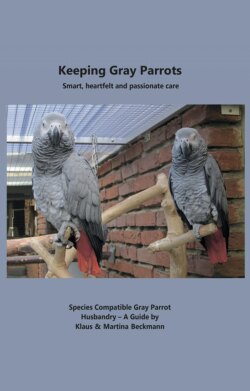Читать книгу Keeping Gray Parrots - Klaus Beckmann - Страница 21
На сайте Литреса книга снята с продажи.
ОглавлениеDiet and nutrition
Hardly any other subject gives rise to such secrecy and discussions as the questions concerning the dietary and nutritional needs of parrots. There is talk about miraculous remedies, exotic fruit or plants, the ultimate nutritional supplements and the like. Parrot forums are chockful of related advice and questions. Posts include photos of exotic herbs, plants or fruit along with questions such as “Is anyone familiar with this?” and “Is it safe for Gray Parrots to eat these?” Of course many “experts” venture out on a limb with their advice.
To tell you the truth, I have never even seen or heard of most of these exotic solutions.
A few years ago, I was contacted by a parrot owner who had been keeping Gray and Amazonian Parrots for some 25 years. He asked me to review and verify his feeding patterns. He emailed me a list of all types of birdfeed, nutritional supplements and medicines along with his feeding schedule. It actually made me a little sick to the stomach. He was ordering miraculous substances as well as additives from all over the world. He regularly administered them to his parrots. I did not even know 80 % of the listed nutritional supplements and had never heard of them before. He spent massive amounts of money on the “species adequate” nutrition of his beloved parrots and was concerned that despite an allegedly perfect diet, they lacked agility, looked plucked, sat on their perches all day, and did not have an interest in procreation. I looked over the entire feeding plan and changed it, while telling him to dispose of most of the “miracle products.” It did not take long at all for his birds to turn into a highly active flock with only one hen continuing to pluck herself.
Two of his pairs have had offspring since then. This example demonstrates that the most expensive does not always have to be the best. It is in fact possible to provide species compatible nutrition using simple ingredients and to keep your parrots in excellent health. In my opinion, the body’s own immunity provides the best protection from diseases. After all, birds who live in the wild are not constantly pumped full of substances of any kind – their own bodies do the work. This is why the activation and maintenance of the immune system is my top priority.
Our birds are agile, even keel and their plumage is always in optimum condition. They procreate at regular intervals; enjoy the best of health and we achieve this with a very simple diet.
So many foods that have been considered safe for decades that are still completely sufficient. Why experiment? Why are so many parrot owners constantly looking for super foods or exotic herbs that supposedly have miraculous effects?
The benefit/risk factor is another important issue. How does my bird benefit from me offering it all kinds of options? Will it make the parrot more agile? Will the plumage be denser as a result? What do I expect this nutrient to achieve? If the benefits do not outweigh the risk with absolute certainty, I should definitely forego the unknown nutrient and stay away from any and all experiments that could pose potential risks to the bird.
I am also constantly reading stories published by parrot owners who say that their birds will neither eat pellets, fruit nor vegetables. Once again, what it takes is patience. To date, I have always been able to get every parrot to eat the food I consider important for its wellbeing. However, if I offer new food and I replace it with the animal’s favorite after just a few hours or minutes, it is hardly surprising that the new food will not go over well. Parrots are highly intelligent; in fact, their intellect is equivalent to that of a child that is 4 – 6 years old. Moreover, they are extremely persistent and stubborn. Hence, they will always try to trick us. It takes consistency and patience to overcome these challenges. I have not heard of a single parrot who died of starvation sitting in front of a full feeding tray. Eventually, the bird will eat. Obviously, it is helpful to own multiple parrots. If one eats the new food, the others will join in amazingly fast. Food envy is a good motivator. It also makes little sense to offer several types of fruit or vegetables simultaneously. I often see mind-boggling creations of 20 different types of fruit being placed into one feeding tray. This always reminds me of the breakfast buffets offered at 5-star hotels that tempt me to choose only the best items. I will not even touch foods I don’t know or like. Why should birds go about this any differently than people? It makes complete sense that a bird will only eat what it is familiar with and likes. Consequently, if you place food that is unknown to the bird in front of it, it will bypass it and if given the chance, eat the familiar food instead. Hence, if I want my birds to get used to new food, I have to offer the latter exclusively. It may take a few days until the new food is accepted, but they will eventually eat it. Consistency is the magic word, as it always is when it comes to animals and most especially, as far as our intelligent, highly sensitive parrots are concerned.
For Gray Parrots, a good birdseed blend would, for instance, consist of safflower, striped and white sunflower seeds, buckwheat, milo, Dari, pumpkin seeds, hemp, paddy rice, milk thistle, vetches, rose hips, wheat, gloss, silver millet and mung beans.
